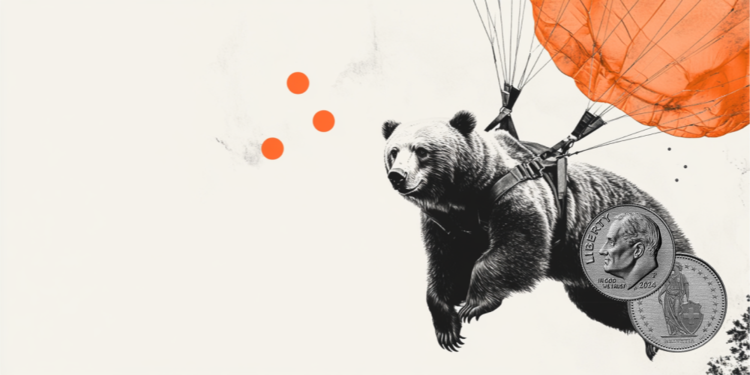- USD/CHF softens to around 0.8335 in Tuesday’s early European session.
- Economic uncertainty and Fed rate cut bets weigh on the US Dollar.
- SNB’s Schlegel warns high market uncertainty is ‘poison’ for growth.
The USD/CHF pair remains under selling pressure around 0.8335 during the early European session on Tuesday. The rising bets that the Federal Reserve (Fed) will lower borrowing costs further this year weigh on the Greenback against the Swiss Franc. Later on Tuesday, the Federal Reserve (Fed) officials are set to speak, including Thomas Barkin, Alberto Musalem, Adriana Kugler, Raphael Bostic, Mary C. Daly and Beth M. Hammack.
Last week, Moody’s downgraded its rating for US sovereign credit, citing worries over the country’s increasing $36 trillion debt burden. The downgrade underscores growing concerns over fiscal deterioration and tariff-induced distortions under US President Donald Trump and exerts some selling pressure on the Greenback.
Meanwhile, Fed officials maintain caution and call for more clarity before committing to policy changes, which caps the upside for the USD. The markets are now pricing in a nearly 91.6% chance of rates holding at 4.25%–4.50% in the June meeting and a 65.1% possibility of no change in July, according to the CME FedWatch tool.
Swiss National Bank (SNB) chairman Martin Schlegel said on Monday that financial market uncertainty is currently “very high,” noting that at such times, appetite for the safe haven CHF increases. The SNB president wouldn’t comment on what might happen next month but emphasized that Switzerland’s “interest rate has a large influence on the exchange rate.”
Swiss Franc FAQs
The Swiss Franc (CHF) is Switzerland’s official currency. It is among the top ten most traded currencies globally, reaching volumes that well exceed the size of the Swiss economy. Its value is determined by the broad market sentiment, the country’s economic health or action taken by the Swiss National Bank (SNB), among other factors. Between 2011 and 2015, the Swiss Franc was pegged to the Euro (EUR). The peg was abruptly removed, resulting in a more than 20% increase in the Franc’s value, causing a turmoil in markets. Even though the peg isn’t in force anymore, CHF fortunes tend to be highly correlated with the Euro ones due to the high dependency of the Swiss economy on the neighboring Eurozone.
The Swiss Franc (CHF) is considered a safe-haven asset, or a currency that investors tend to buy in times of market stress. This is due to the perceived status of Switzerland in the world: a stable economy, a strong export sector, big central bank reserves or a longstanding political stance towards neutrality in global conflicts make the country’s currency a good choice for investors fleeing from risks. Turbulent times are likely to strengthen CHF value against other currencies that are seen as more risky to invest in.
The Swiss National Bank (SNB) meets four times a year – once every quarter, less than other major central banks – to decide on monetary policy. The bank aims for an annual inflation rate of less than 2%. When inflation is above target or forecasted to be above target in the foreseeable future, the bank will attempt to tame price growth by raising its policy rate. Higher interest rates are generally positive for the Swiss Franc (CHF) as they lead to higher yields, making the country a more attractive place for investors. On the contrary, lower interest rates tend to weaken CHF.
Macroeconomic data releases in Switzerland are key to assessing the state of the economy and can impact the Swiss Franc’s (CHF) valuation. The Swiss economy is broadly stable, but any sudden change in economic growth, inflation, current account or the central bank’s currency reserves have the potential to trigger moves in CHF. Generally, high economic growth, low unemployment and high confidence are good for CHF. Conversely, if economic data points to weakening momentum, CHF is likely to depreciate.
As a small and open economy, Switzerland is heavily dependent on the health of the neighboring Eurozone economies. The broader European Union is Switzerland’s main economic partner and a key political ally, so macroeconomic and monetary policy stability in the Eurozone is essential for Switzerland and, thus, for the Swiss Franc (CHF). With such dependency, some models suggest that the correlation between the fortunes of the Euro (EUR) and the CHF is more than 90%, or close to perfect.

